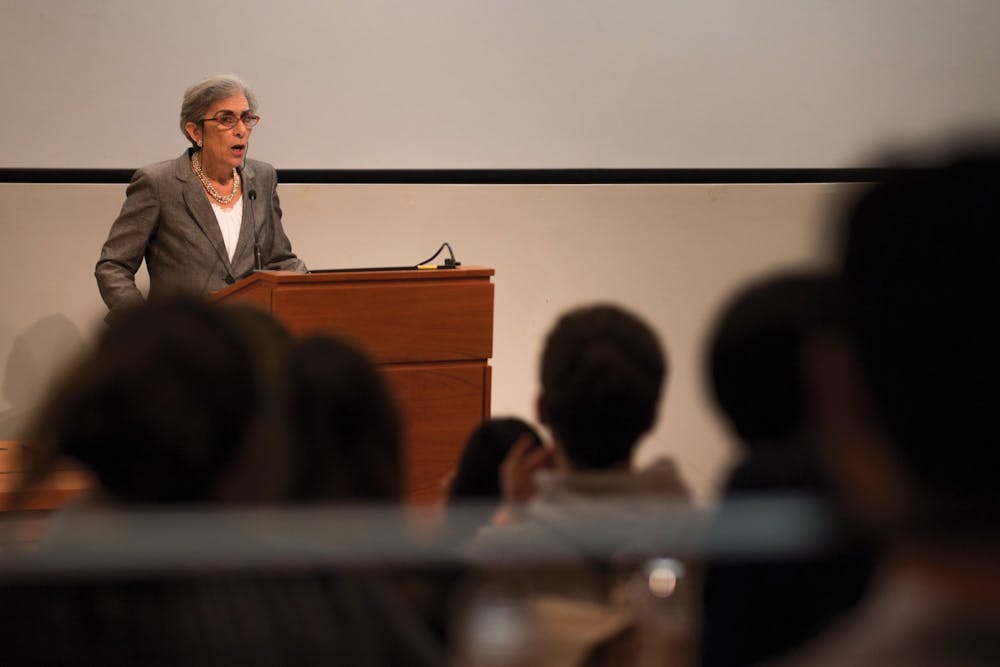Racist remarks towards her students and various demographics such as the Asian American community have caused great controversies for Amy Wax's career. For the sake of our own sanity and yours, we will not give further publicity to her exact words. Drawing further attention to her comments is akin to catering to the bully. But Wax’s willingness to embroil herself in controversies is a topic worth exploring.
Enrollment count in Wax’s law seminars has seen a dramatic decline after her comments on race and immigration sparked a national controversy. Though counterintuitive to her position as a professor, student dissatisfaction and low participation doesn’t matter to her. After all, law students are hardly her audience.
Richard Schechner is often credited for coining the notion of performance theory. As a concept, performativity does not only include a theatrical performance on stage; it permeates every fiber of the world.
While you don’t need to agree with Schechner’s theory, it is hard to argue against the fact that there is often a performative aspect to the way we go about our daily lives. From mundane things such as the clothes we wear to decisions like the diamond size one buys for their fiance, every action sends a signal — they are all performances of some sorts. The more dramatic the performance, the greater attention it attracts. One might argue that Wax has put on quite the performance herself.
Can you name the second most controversial professor at Penn? Hopefully not. Wax has differentiated herself from the crowd with her performance. She might be an extreme case, but society is no stranger to differentiation. You don’t pass the resume screen with average statistics, nor do you get promoted by being middle of the pack. There is a need to be seen.
Every performance requires an evaluative metric. For academia, it’s citations. We measure professors by the number of citations they have and the publicity they muster. Theories are not only vehicles of knowledge exploration, but a method to build social capital for the theorist. This creates a fundamental tension in the world of academia between the pursuit and commodification of knowledge. It’s an evident example of incentive misalignment.
The quantification of a university scholar’s success is already damaging. It is further exacerbated by the pitifully limited means at our disposal to do so. But where are the other methods? We claim that students shouldn’t be evaluated purely on test scores, and instead be looked at holistically. However, we neglect to recognize that professors and scholars deserve the same treatment. A high h-index or impact factor does not define a professor.
What about the strength of their teaching abilities? What about their efforts to maintain a safe campus community? However, research candidates are often told early on in their careers to focus on narrow areas of research instead of teaching. After all, teaching rarely is the key to a tenureship. And yet, the frontier of knowledge that research represents is only valuable if it can be inherited, and the scholars of tomorrow are the students of today.
Here’s a simple observation. In order to get citations, you must get noticed. Now, interestingly enough, you don’t need people to agree with you. People can cite you in fervent agreement or blatant dispute. After all, simple citation count doesn't discern between positive and negative citations.
The lack of other dimensionalities fosters a race to the bottom. In marketing, the race to the bottom is pure price competition. Although it's a situation that companies strive to avoid, the prices are bounded by the costs of product production and sale. Academia’s race to the bottom has to do with the extent to which academics can distinguish themselves. Normally, the act of differentiation quickly gets costly through reputational burdens and job security. But tenure often absorbs these costs and provides a hefty buffer of safety.
Yet the cost doesn’t disappear — it transfers. Students who belong to marginalized communities might have their well-being and safety damaged by professors like Amy Wax. The psychological harm is unseen, but it is every bit as real as physical harm. The institution and academia overall also bear reputational burden as a result.
Tenureship attracts talented scholars worldwide, bolsters economic stability, and provides greater freedom for faculty to “pursue research and innovation and draw evidence-based conclusions free from corporate or political pressure,” as defined by the American Association of University Professors. Simply put, tenureship offers the freedom to posit, theorize, publish, and debate in a scholarly setting.
But with freedom comes responsibility. And tenureship has allowed Wax’s show to go on for far too long. As it stands today, tenureship allows performativity to transform academia into a contest of publicity, not brilliance.
SAM ZOU is a College senior studying political science from Shenzhen, China. His email is zous@thedp.com.
ANDREW LOU is a Wharton and Engineering junior studying finance, statistics, and computer science from Connecticut. His email is alou6683@wharton.upenn.edu.









